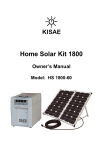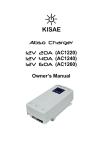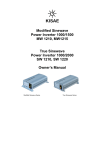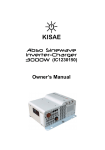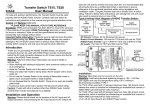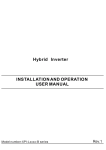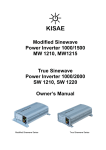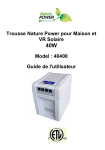Download KISAE Home Solar Kit 1800 User Manual
Transcript
Home Solar Kit 1800 Owner’s Manual Model: HS 1800-60 For safe and optimum performance, the Home Solar Kit must be used properly. Carefully read and follow all instructions and guidelines in this manual and give special attention to the CAUTION and WARNING statements. PLEASE KEEP THIS MANUAL FOR FUTURE REFERENCE Note: Due to unit contain large battery capacity, upon purchasing, immediately charge unit for more than 24 hours or through the solar panel for more than 72 hours depending on the availability of the sun light. To guarantee maximum device performance and life span if the unit is not connected continuously to utility power or not connected to the solar panel, it is recommended to charge the unit after each use and once every 90 days. Disclaimer While every precaution has been taken to ensure the accuracy of the contents of this guide, KISAE Technology assumes no responsibility for errors or omissions. Note as well that specifications and product functionality may change without notice. Important Please be sure to read and save the entire manual before using your KISAE Home Solar Kit. Misuse may result in damage to the unit and/or cause harm or serious injury. Read manual in its entirety before using the unit and save manual for future reference. Service Contact Information Email: [email protected] Page 2 Table of Contents 1. INTRODUCTION ....................................................................................................4 2. PRODUCT DESCRIPTION ...................................................................................6 3. INSTALLATION......................................................................................................6 4. CONFIGURATION .................................................................................................9 5. OPERATION.........................................................................................................12 6. TROUBLESHOOTING ........................................................................................16 7. SPECIFICATIONS ............................................................................................... 17 8. OPTIONS FOR EXPANSION ............................................................................. 17 9. WARRANTY .........................................................................................................18 Page 3 1. INTRODUCTION Thank you for purchasing the KISAE Home Solar Kit. With our state of the art, easy to use design, this product will offer you reliable service for providing a solar-powered rechargeable power source for your home, cabin, or campsite. With its highly technical design and comprehensive features, the KISAE Home Solar Kit will provide you with a simple yet effective user experience as you learn to generate your own power. The KISAE Home Solar Kit can run many AC-powered appliances whenever you need power. Its battery is expandable for times when you require longer run times, and its automatic transfer switch built inside means that you can switch seamlessly from household utility power to the power you generate from the sun. This manual will explain how to use this unit safely and effectively. Please read and follow these instructions and precautions carefully. NOTE: Upon purchasing, immediately charge unit through utility power for 24 to 48 hours or through the solar panel for more than 72 hrs. To guarantee maximum device performance and life span, it is recommended to continuously connect the unit to utility power or solar panel to top up the internal battery or else to charge the unit after each use and once every 90 days IMPORTANT SAFETY INFORMATION This section contains important safety information for the KISAE Home Solar Kit. Each time, before using the KISAE Home Solar Kit, READ ALL instructions and cautionary markings on or provided with the inverter/charger, the batteries, and all appropriate sections of this guide. The KISAE Home Solar Kit contains no user-serviceable parts. See Warranty section for how to handle product issues. FIRE AND/OR CHEMICAL BURN HAZARD Do not cover or obstruct any air vent openings and/or install in a zero-clearance compartment. Do not use the KISAE Home Solar Kit, if the unit is visibly leaking some type of liquid. It is possible that the internal battery has been damaged and battery acid may have spilled. FAILURE TO FOLLOW THESE INSTRUCTIONS CAN RESULT IN DEATH OR SERIOUS INJURY When working with electrical equipment or lead acid batteries, have someone nearby in case of an emergency. Wear eye protection and gloves. Avoid touching your eyes while using this unit. Keep fresh water and soap on hand in the event battery acid comes in contact with eyes. If this occurs, cleanse right away with soap and water for a minimum of 15 minutes and seek medical attention. Batteries produce explosive gases. DO NOT smoke or have an open spark or fire near the system. Keep unit away from moist or damp areas. Page 4 Avoid dropping any metal tool or object on the battery. Doing so could create a spark or short circuit which goes through the battery or another electrical tool that may create an explosion. WARNING: Shock Hazard. Keep away from children! Avoid moisture. Never expose unit to water. Unit provides 120Vac from inverter or by pass utility power, treat the output socket the same as regular wall AC sockets at home. WARNING: Explosion hazard! DO NOT use the KISAE Home Solar Kit in the vicinity of flammable fumes or gases (such as propane tanks or large engines). AVOID covering the ventilation openings. Always operate unit in an open area. Prolonged contact to high heat or freezing temperatures will decrease the working life of the unit. Unit exposure to these elements may lead to cracking and decreased capacity of the internal battery. FCC INFORMATION This equipment has been tested and found to comply with the limits for a Class B digital device, pursuant to part 15 of the FCC Rules. These limits are designed to provide reasonable protection against harmful interference in a residential installation. This equipment generate, uses and can radiate radio frequency energy and, if not installed and used in accordance with the instructions, may cause harmful interference to radio communications. However, there is no guarantee that interference will not occur in a particular installation. If this equipment does cause harmful interference to radio or television reception, which can be determined by turning the equipment off and on, the user is encouraged to try to correct the interference by one or more of the following measures: • Reorient or relocate the receiving antenna. • Increase the separation between the equipment and the receiver. • Connect the equipment into an outlet on a circuit different from that to which the receiver is connected. • Consult the dealer or an experienced radio/TV technician for help. LIMITATIONS ON USE Do not use in connection with life support systems or other medical equipment or devices. BATTERY RECYCLING The unit is designed to provide years of service. However, the internal battery is not designed to be user replaceable. Because the internal battery installed inside the battery box contains lead, which can be hazardous if exposed to the environment, the battery box should be recycled or safely disposed of at your local recycling depot. Do not dispose of the battery box with common household waste. Please ask your local authorities about recycling services that are available in your area. Page 5 2. PRODUCT DESCRIPTION The KISAE Home Solar Kit package includes the items list below. Home Solar Kit base unit (P/N: HS 1800-60) 80W Folding Solar Panel (P/N: HS SP80-12) Owner’s manual (P/N: HS MU1800) 3. INSTALLATION WARNING: FAILURE TO FOLLOW THESE INSTRUCTIONS CAN DAMAGE THE UNIT. Before beginning your KISAE Home Solar Kit Installation, please consider the following: The KISAE Home Solar Kit base unit should be used or stored in an indoor area away from direct sunlight, heat, moisture or conductive contaminants. The solar panel of course can be installed outdoors where the best access to sunlight occurs. When placing the unit, allow a minimum of three inches of space around the unit for optimal ventilation. When placing the unit, allow a minimum of three inches of space around the unit for optimal ventilation. Charge battery immediately upon purchasing this product. To ensure optimum battery run time and life expectancy, leave KISAE Home Solar Kit continuously plugged into utility AC power and/or leave solar panel plugged into the unit to charge internal battery Main Unit Installation IMPORTANT: The AC plug on the power supply cord is used as the disconnect device. The socket-outlet shall be installed near the equipment and shall be easily accessible To install the unit, plug the AC input power cord directly into a wall outlet and unit is ready to use. Note: Although the unit is grounded through the ground pin of the AC plug, it is highly recommended to ground the battery box through the ‘Grounding Electrode Terminal’ locates at the back of the battery box. Page 6 Follow instruction below to test the unit: Turn unit on by pressing and holding the Power button for about a second until a beep sound occur. The ‘Status’ light turns on indicating the KISAE Home Solar Kit is ON. The unit is functioning in standby mode and is ready to provide backup power. AC output is now being provided directly from utility power. If the battery capacity is low and needs to be recharged, the LED screen on display flashes “CHG” during the charging process and flashes “Ful” until battery is fully charged. Unplug the input power cord to simulate power failure. The status LED on display will turns amber indicate unit is running in backup power mode. AC output is now being provided from battery power. Reconnect the AC power cord into a wall outlet will switch unit back to standby mode and AC output is now being provided directly from utility power again. The unit is successfully installed and functioning properly. PV Solar Panel Installation WARNING: Shock, fire and energy hazards. Make sure the solar panel is covered with an opaque sheet or facing the ground before connected or disconnected the cable wire to the solar panel junction box. All wiring must be done in accordance with applicable local and national electrical wiring codes. Connect Unit to Solar Panel: WARNING: Shock, fire and energy hazards. The Solar input port is rated at 17.5V 8A and is designed to be used with the supplied Home Solar Kit 80W solar panel. If a non Home Solar Kit 80W solar panel is use, be sure the solar panel is design for a 12V battery system and with maximum open circuit voltage less than 25 VDC. Please refer to the specifications label on the solar panel before connecting. Do not connect with PV source capable of delivering more than 8 amps. Connect solar panel with higher voltage or current rating will permanently damage the unit and may cause fire and energy hazard. CAUTION: Reverse polarity. Improper connections (reversing the wire connection on the solar panel connection box) will cause the unit to malfunction and may permanently damage the unit. Damage caused by a reverse polarity connection is not covered by your warranty. Plug in the solar panel cord plug to the solar input port located at the back of the KISAE Home Solar Kit battery box. Please noted the polarity of the connector. Page 7 Remove the opaque sheet or flip the solar panel with solar cell surface facing upwards. Adjust the mounting fringe of the solar panel to have the solar cell surface facing directly to the sunlight to achieve the maximum power. When sunlight is available, the solar charge indicator should automatically turn on and the “Solar Charge Indicator” should either flash or solid depending on the battery status. NOTE: It is recommended to always charge the internal battery to a 100% state-ofcharge, as shown by a steady green on Solar charger indicator. Disconnect Solar Panel from Unit: Cover the solar panel with an opaque sheet or flip the solar panel with the solar cell facing a flat ground to minimize the output voltage to zero volts. Verify the Solar charge indicator is off. Disconnect the solar cable connector from the solar input port of the unit. Install a Second Battery Box: (optional) Connect the unit with a second battery box (P/N HSK BX60) will double the unit run time. Follow the detail installation guide provide with the second battery box for second battery box installation. See also below a brief guideline to access the built in auxiliary DC input port on this main unit and how the secondary battery box is connected. Please be sure the AC power cord is unplugged and the unit is turned off. Remove the top right panel by unscrewing the two screws located on the top right corners of the panel. The auxiliary port is located inside the compartment. Place the optional battery box (P/N HSK BX60) on the right hand side of the main unit. Ground the two battery boxes together and to earth ground by using the supplied ground cable through the “Grounding Electrode Terminal” Take out the auxiliary DC input port from the main unit and connect it to the second battery box output port. Page 8 The unit is now ready to provide power to double the run time. Tips: The second battery box is design to be stackable. Using the above procedure can parallel multiple battery boxes. 4. CONFIGURATION Please read the following table to fully understand unit settings and desire your own desirable settings. Unit default setting is “Full Automatic” (In1, Ch1, Al1). Understanding of Unit Setting Inverter Setting In0 Inverter is disabled, unit will not provide backup function when utility power is not available In1 Inverter is set to standby mode. Unit will provide backup function when utility power is not available In2 Inverter is forced to turn on even when AC utility power is available. The inverter will only switch back to utility mode when internal battery is getting low. With this setting, the 5A internal charger is set to Ch0 by default. Charger Setting Ch0 Internal 5A charger is disabled. The charger will not charge the internal battery when utility AC is available. Ch1 Internal 5A charger is enabled. Charger will automatically charge the internal battery when AC is available. Alarm Setting AL0 Audio alarm sound is disabled. Alarm will not sound when warning and fault occur. AL1 Audio alarm sound is enabled. Alarm sounds when warning or fault occurs. Unit Function Setting Mode of Setting Operation In1 Ch1 AL1 Full Automatic (Factory default) Unit Function AC output is provide by AC utility when utility is available Internal battery is automatically charged by the 5A charger AC output will automatically switch to inverter mode power by the internal battery when utility is not available Audio alarm is enabled and will sound when any warning or fault occurs Page 9 In1 Ch1 AL0 Full Automatic Silent Same as “Full automatic mode” but with alarm disabled. Audio alarm will not sound when any warning or fault occurs. The unit fault protection features remain active and will shutdown without audio warning when fault occurs. In1 Ch0 AL1 Auto Backup with AC Charger Disable Same as “Full automatic mode” but with 5A AC charger disabled. Battery can only be charged by the solar panel or external charger. Only use this mode when there is sufficient solar power or external charger to charge the internal battery In1 Ch0 AL0 Auto Backup with AC Charger & Alarm Disable Same as “Auto backup with AC charger disable mode” but with alarm disabled. Audio alarm will not sound when any warning or fault occurs. The unit fault protection features remain active and will shutdown without audio warning when fault occurs. In2 Ch1 AL0 or 1 Setting is not available Not available for user setting In2 Ch0 AL1 Backup Priority Unit will provide output using battery and solar power as higher priority. AC output will only switch to utility mode when battery is low and available. Audio alarm is enabled and will sound when any warning or fault occurs Note: Only use this mode when there is sufficient solar power to power up the load. In2 Ch0 AL0 Backup Priority with Alarm Disable Same as “Backup priority mode’ but with alarm disabled. Audio alarm will not sound when any warning or fault occurs. The unit fault protection features remain active and will shut down without audio warning when fault occurs. In0 Ch1 AL1 Backup Disable AC output is provided by AC utility when utility is available Internal battery is automatically charged by the 5A charger Inverter is disabled and no backup power occurs when AC utility is not available. Audio alarm is enabled and will sound when any warning or fault occurs Page 10 In0 Ch1 AL0 Backup & Alarm Disable Same as “Backup disable mode” but with alarm disabled. Audio alarm will not sound when any warning or fault occurs. The unit fault protection features remain active and will shut down without audio warning when fault occurs. In0 Ch0 AL1 Backup & Charger Disable AC output is from utility AC power. No AC output when utility AC is not available. In0 Ch0 AL0 Backup, Charger & Alarm Disable AC output is from utility AC power. No AC output when utility AC is not available. Unit Display Label as shown To change unit function: To enter the feature setting mode, press and hold “Power” and “Select” button together for about 5 seconds until a beep is sounded. Display will show current inverter setting as “In0 or In1 or In2” Press and hold “Select” button for 1 second to toggle between the three settings. Once the desired setting is selected, press and hold “Power” button for 1 second to set the desired setting and carry on with setting the other feature. Display will show current charger setting as “Ch0 or Ch1” Press and hold “Select” button for 1 second to toggle between the two settings. Once the desired setting is selected, press and hold “Power” button for 1 second to set the desired setting and carry on with setting the other features. Display will show current alarm setting as “AL0 or AL1”. Press and hold “Select” button for 1 second to toggle between the two settings. Once the desired setting is selected, press and hold “Power” button for 1 second to set the desired setting and carry with setting the other features. Display will show “Fd” factory default setting. If you desire to use the factory setting, Page 11 press and hold ‘Power’ and ‘Select’ button together for 5 seconds to exit the setting mode. If you wish to keep all the previous settings on inverter, charger and alarm, just press ‘Power” button for 1 seconds and press and hold ‘Power’ and ‘select’ button together for about 5 seconds to exit the feature setting mode. Note: Press and hold ‘Power’ and ‘Select’ button together for 5 seconds at any time to exit the feature setting mode. See feature setting chart below. 5. OPERATION WARNING: RISK OF EQUIPMENT DAMAGE Do not plug surge-protected power bars into the unit’s 120 VAC outlets. Do not connect an AC power source to the 120 VAC outlets. Do not connect the unit’s AC power input cord to its 120 VAC outlets. Operating the main unit Mode Full Automatic In1,Ch1, Status LED Display Condition Solid green “Ful” AC output is supplied by utility AC power Internal battery is fully charged Flashing Flash “XX” AC output is supplied by utility AC power Page 12 Al1 Full Automatic Silent In1,Ch1, Al0 Auto backup with internal AC charger disable In1, Ch0, Al1 Auto backup with internal AC charger and alarm disable In1, Ch0, Al0 Backup green battery capacity in % Charging of internal battery by 5A charger is in progress Solid amber Flash between Output Power “X.XX” in kW & “XX” battery capacity in % AC output power is supplied by the inverter through internal battery and/or your KISAE solar power or another external solar panel or external charger Flashing amber Same as above Same as above and utility AC power is just detected and AC output will switch to utility power within a few seconds Solid red “E01-E11” Error on unit is detected. AC output is disconnected. See Trouble shooting section Same as “Full Automatic Mode” but with audio alarm disabled. The unit fault protection features remain active and will shut down without audio warning when fault occurs. “Ful” AC output is supplied by utility AC power. Internal battery is fully charged “XX.X” in % AC output is supplied by utility AC power. Internal battery is not fully charged. Display show battery capacity Solid amber Flash between Output Power “X.XX” in kW & “XX” battery capacity in % AC output power is supplied by the inverter through internal battery and/or KISAE solar panel or another external solar panel or charger. Flashing amber Same as above Same as above and utility AC power is just detected and AC Output will switch to utility power within a few seconds Solid red “E01-E11” Error on unit is detected. AC output is disconnected. See Trouble Shooting section Solid green Same as “Auto backup with AC charger disable mode” but with audio alarm disabled. The unit fault protection features remains active and will shut down without audio warning when fault occurs. Solid Flash between AC output power is supplied by the inverter Page 13 priority In2,Ch0, Al1 Backup priority with alarm disable In2,Ch0,Al 0 Backup disable In0,Ch1, Al1 Backup disable with alarm disable In0,Ch1, Al0 Backup and charger disable In0,Ch0,Al 0or Al1 amber Output Power “X.XX” in kW & battery capacity “XX” in % through internal battery and/or solar power Solid green “XX” in (%) AC output is supplied by utility AC power Display shows battery capacity Solid red “E01-E11” Error on unit is detected. AC output is disconnected. See Trouble Shooting section. Same as “Backup Priority mode” but with audio alarm disabled. The unit fault protection features remain active and will shut down without audio warning when fault occurs. Solid green “Ful” AC output is supplied by utility AC power Internal battery is fully charged Flashing green Flash between “Chg” & “XX” battery capacity in % AC output is supplied by utility AC power Charging of internal battery by 5A charger is in progress Same as “Backup disable mode” but with audio alarm disabled. The unit fault protection features remain active and will shut down without audio warning when fault occurs. Solid green “Ful” AC output is supplied by utility AC power and battery is full charge Green “XX” in (%) AC output is supplied by utility AC power and display shows battery capacity Operating the PV Solar Input The battery box is comes with a solar input port and a DC to DC controller that provides an alternative method to charge the internal battery. A solar charge indicator located at the back of the battery box to indicate the charging status of the internal battery. The DC to DC controller is a fully automatic self-sustaining device that will initiate the charge cycle when solar power is available. Please note that the DC to DC controller is designed to be used with the provided KISAE 80W solar panel. Connected to other solar panel may damage the unit or over charge the battery. If insufficient charge capacity is not available from the solar source, it is recommended to use the internal 5A charger to complete the battery charging process through the utility. Page 14 Understanding the Error Codes Error Code Condition Corrective Action E01 Inverter has sensed input under voltage and has shutdown Recharge battery immediately and restart unit E02 Inverter has sensed input over voltage and has shutdown Check battery voltage or if any external charger is connected to the battery box E03 Inverter output has sensed overload or short circuit and was shutdown Check load connected to the output. Reduce load and restart the unit E04 Inverter has sensed internal temperature was high and has shutdown Turn unit off and wait for 15 minutes before restarting. Check if any object has blocked the air flow of the unit E05 Inverter has sensed low voltage input and warning occurs Recharge battery as unit will shut down shortly E06 Inverter has sensed output load is high and overload shutdown is near Check load connected to the output. Reduce load. E07 Inverter has sensed internal temperature is high and is close to thermal shutdown limit Reduce load and check if any ventilation of the unit is blocked. E08-09 Not used E10 Battery reaches high voltage Check battery voltage or if any external charger is connected to the battery box E11 Transfer relay has sensed high temperature and shutdown Check load connected to the output. Reduce load and check if any ventilation of the unit is blocked E12 Not used Estimate Run time on Load Following run time is an estimate based on using a single battery box with 60AH battery on specific load used for testing. Actual run time may vary. Consumption Estimate Run time Cordless Phone Load 5W 90 hrs Home Alarm System 5W 90 hrs Clock/Radio 8W 50 hrs Table Lamp 40W/60W 10 hrs/ 6 hrs Freezer (8.8 cu. ft.) 80W 4.5 hrs 20” LCD TV 100W 4.0 hrs Refrigerator (18 cu. ft.) 120W 3.5 hrs Sump Pump (1/2 hp) 300W 55 min Microwave (mid size) 1000W 20 min Coffee Maker 1200W 10 min Page 15 Tips: Maximize the usage of your KISAE Home Solar Kit During times of power outage, here are some tips to maximize your run times for key back-up power applications: Do not leave appliances on when not in use because they will drain the internal battery For computer use, use laptop, or desktop computer with LCD monitor instead of desktop computers with CRT monitor. Use small televisions instead of big screen TV’s Use small desk lamps (25 to 40 W) instead of high-wattage lamps. Battery Replacement The battery box contains a 60AH battery. Qualified battery/electronic technician is required to replaced the battery. To replace the battery, please contact customer service for details. 6. TROUBLESHOOTING To trouble shoot the unit, please note the error code display on the main unit and review the “Understanding the Error Codes” in section 5. Problem Symptom Solution Products connected to unit malfunction or overheat Products connected to unit do not accept modified sine-wave waveform Products are not compatible with the modified sine wave output produced by the KISAE Home Solar Kit. See “Precaution for using rechargeable application” on page XX Insufficient runtime Battery is not fully charged Charge battery by leaving the unit plugged to the utility for more than 24 hrs to fully charge the battery or leave the solar panel plugged into the battery box for more than 72 hrs Battery is near the end of it’s life Replace battery box Solar panel cannot supply sufficient power to start the solar charger and charge the battery Check location and direction of solar panel Wrong wire connection on solar panel junction box Verify solar panel junction box connection Ground fault is detected on the solar panel and it shuts down the solar panel DC to DC controller Check for any damage on solar panel. Replace Ground Fault Detection fuse located at the back of battery box Unit is off Turn unit on Unit has shutdown due to various potential conditions Check utility, battery voltage, and unit settings. See Unit Operation section Solar Charger indicator is not ON when solar panel is connected Unit has no output Page 16 7. SPECIFICATIONS Note: Specifications are subject to change without notices. Inverter Specification: Output Current/Power: 12A/1440W continuous 15A/1800W maximum Surge Power: 2880W peak Output Voltage: 120 VAC/ 60 Hz Output Waveform: Modified Sinewave Peak Efficiency: 90% No Load battery draw (unit in standby): < 3W DC Input Voltage operating range: 10.5 – 15.5 Vdc Internal AC Charger Specification: Output Current: 5 ADC Output Voltage (Absorption/Float): 14.8/13.5 VDC Recharge Voltage: 12.6 VDC Efficiency: 80% Charger type: 3 stages (bulk/absorption/float) Solar Panel Charger Specification: Output Current: 8A maximum Output Voltage: 14.8/13.5 VDC Recharge Voltage: 12.6 VDC Input DC Voltage: 9 - 26 VDC maximum Efficiency: >95% Charger Type: PWM control Battery Specification: Battery Capacity: 12V, 60Ah Battery Type: Sealed Lead Acid (Deep cycle) Regulatory Approval (ETL certify): Conforms to UL 1778 Certified to CSA C22.2 no. 107.1 8. OPTIONS FOR EXPANSION This Home Solar Kit is a modular design. Battery capacity can easily be extended with multiple standalone KISAE battery boxes or to external 12 Volt batteries through the external mating connector to connect in parallel with the unit through a pre-wired built-in internal connector located by the side of the unit. External AC or Solar chargers are also available to improve battery charging time. For more information, please visit www.kisaetechnology.com or talk to your local supplier. Extend unit run time with KISAE solution: Purchase KISAE 12V 60Ah battery box with 8A solar input port (P/N HS BX60-00) Purchase KISAE Mating connector with wire and ring terminal (P/N HS CB175-03) to connect your own 12 Volt battery. Reduce battery charging time with KISAE solution: The following options are available to improve battery charging time. 20/40A high current charger 30A DC to DC controller 30A MPPT controller 80W Solar panel Page 17 9. WARRANTY One Year Limited Warranty The limited warranty program is the only one that applies to this unit, and it sets forth all the responsibilities of KISAE. There is no other warranty, other than those described herein. Any implied warranty of merchantability of fitness for a particular purpose on this unit is limited in duration to the duration of this warranty. This unit is warranted, to the original purchaser only, to be free of defects in materials and workmanship for one year from the date of purchase without additional charge. The warranty does not extend to subsequent purchasers or users. Manufacturer will not be responsible for any amount of damage in excess of the retail purchase price of the unit under any circumstances. Incidental and consequential damages are specifically excluded from coverage under this warranty. This unit is not intended for commercial use. This warranty does not apply to damage to units from misuse or incorrect installation/connection. Misuse includes wiring or connecting to improper polarity power sources. RETURN/REPAIR POLICY: If you are experiencing any problems with your unit, please contact our customer service department at [email protected] before returning product to retail store. After speaking to a customer service representative, if products are deemed non-working or malfunctioning, the product may be returned to the purchasing store within 30 days of original purchase. Any defective unit that is returned to manufacturer within 30 days of the date of purchase will be replaced free of charge. If such a unit is returned more than 30 days but less than one year from the purchase date, manufacturer will repair the unit or, at its option, replace it, free of charge. If the unit is repaired, new or reconditioned replacement parts may be used, at manufacturer’s option. A unit may be replaced with a new or reconditioned unit of the same or comparable design. The repaired or replaced unit will then be warranted under these terms for the remainder of the warranty period. The customer is responsible for the shipping charges on all returned items. LIMITATIONS: This warranty does not cover accessories, such as adapters and batteries, damage or defects result from normal wear and tear (including chips, scratches, abrasions, discoloration or fading due to usage or exposure to sunlight), accidents, damage during shipping to our service facility, alterations, unauthorized use or repair, neglect, misuse, abuse, failure to follow instructions for care and maintenance, fire and flood. If your problem is not covered by his warranty, call our Customer Service Department at [email protected] for general information if applicable. Page 18


















